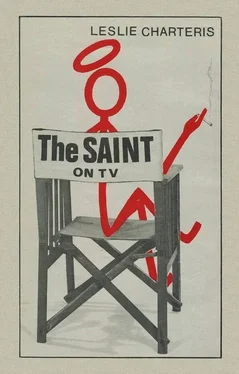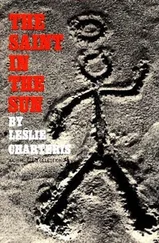Leslie Charteris
The Saint on TV
When, after many years of noble and lofty-minded resistance, I finally broke down and sold the Saint to the Philistines of Television, I fear that I must have added one more argument to the armory of the cynics who maintain that every man has his price, because I certainly got mine. It must have been a shattering blow to the countless millions who until then had thought I was perfect, even though I myself had never made that claim.
However, I did have enough remnants of probity to limit his period of bondage to two years, knowing full well the voracity of the mills which grind out the fodder for what I still regard as the mini-medium of mini-minds, and figuring that in that time, at the relentless pace of one show a week, they would have devoured the entire product of a not inactive writing lifetime, or anyway as much of it as was suitable for adaptation to filmlets of about 50 minutes without the commercial “messages” and the pauses for what is hilariously called “station identification.” I was resigned to the expectation that my stories would be considerably garbled and mutilated to conform either with the puerile tabus of unwritten censorships or the congenital megalomania of all movie-makers who can never resist “improving” any literary creation that falls into their power, or both; but it had never occurred to me to allow the Saint to be projected into plots that had absolutely no connection whatsoever with anything I had ever written, and in fact any such liberties were specifically prohibited in my first contract.
Despite all the distortions and emasculations which shook up a probable majority of hitherto faithful readers of the Saint books, that first TV series was a big hit in Britain (where it was made) and many European countries, and was even fairly successful in the United States although presented in most areas at such impossible hours that only chronic insomniacs, night watchmen, or veritably fanatic fans would have caught it. Indeed, the American success was remarkable enough for NBC to become interested in putting the show on their full network, in color, and in what is called “prime time” — promotion which had never before been offered to any series previously established in syndication.
The interesting situation then was that the British TV producers could not thumb out this possible plum without making a new deal with me, which would necessarily include the right to create original scripts.
Well, the cynics will recognize it as the same old story. After you’ve succumbed once, it is so much easier to succumb again. Especially when the bribe can be made so much fatter. And I have never pretended that I chose a career in writing without the most powerful mercenary motives.
So, after many hesitations and much tough bargaining, and not without very grave misgivings, I eventually consented.
The rest is history, of a sort. Many of the results, fulfilling my worst forebodings, were lamentable. But many of the so-called “adaptations” of my own cherished stories were no less lamentable, after the weird wizardries of television production got through with them. Some of those “adaptations,” in defiance of every contractual safeguard, had been almost unrecognizable anyhow. Some of the new original scripts were not much worse. Some were passable. And a few, to my pleasant surprise, were quite good.
Enter, next, three other Tempters: The Saint Magazine , which in 137 issues had just about exhausted the reservoir of Saint material, in spite of all the additions I had myself been able to make to the Saga during its existence, and my book publishers in America and Britain (to put them in alphabetical order) who had labored so stoutly for me in my rising years but had long since been bemoaning the indolence of success, and who were perpetually pleading with me to give them new Saint books which, they guaranteed, would be hungrily lapped up by hordes of starved aficionados throughout the British Empire and the United States (to put them in alphabetical order). Why not, they conjointly urged, extend the Saga to include readable versions of some of the best of the televised inventions — subject, of course, to my own final editing?
The idea was interesting, and by no means unique in literature. Even aside from the notable “Solar Pons” pastiches by August Derleth (of which several first appeared in The Saint Magazine ) Sherlock Holmes himself had been perpetuated far beyond the range of Conan Doyle in several movies and innumerable radio series episodes based merely on the character and retailing episodes that Doyle never dreamed of. Barry Perowne, by arrangement with the estate of the late E. W. Hornung, continued the adventures of Raffles into modern times in a considerable number of stories (many of which were also first published in The Saint Magazine ). Even while I was thinking it over, I heard that the heirs to the Ian Fleming copyrights were contemplating a continuation of the James Bond mythology — arrangements for which have since been concluded. If such a process could be tolerated by such a distinguished range of fictional characters, why should I reject it for the Saint?
If I had turned it down, there would still have been nothing I could do, so far as I know, to enjoin my own heirs from buying the same proposition some day — or, worse still, to prevent it being done without even any benefit to them by some later larcenist taking advantage of the privileged piracy sanctioned by the iniquitous concept of “public domain.” But by permitting it now, besides enjoying some of the financial fruits myself, I would have one privilege which was denied to all the other authors I have cited: I could personally watch over and to a great extent control the desecration.
These original scripts, after all, were by agreement first submitted to me as synopses, on which I was permitted to make criticisms and suggestions, even if the producers did not invariably adopt them. The resulting scripts were again submitted to me, and again subjected to my comments, even though these were not always embodied in the final films. Now I would be in a position to choose, first, the scripts which did least violence to my own concept of a Saint story. Furthermore, the story-form adaptations would be made under my own direct and absolute supervision, permitting me to change and improve on the basic material in any way I thought desirable, in a possibly unique reversal of the usual system under which the producer takes it upon himself to improve on the author. Finally, I would personally revise every page of the adaptations, making an honest effort to ensure that in style and phrase they were as fair a facsimile of my own writing as could be achieved without my doing all the work.
What you are about to read, therefore, is an interesting and perhaps unprecedented experiment in team work. It is not, in any sense, a ghosted job, because I do not pretend to be the outright author. For these first offerings (and if they are well received there will be more) I have chosen story lines by John Kruse, whom I rate as easily the best TV scripter who has worked on the show, and the novelizations are by Fleming Lee, a promising young writer who I think will presently make a name of his own. I have done the back-seat driving, and added a few typical flourishes of my own. Obviously, the composite result is not even now exactly the way it might have been if I had written it all myself. But it is as close as any imitation is ever likely to get.
— Leslie Charteris
The death game
[1] Adapted by Fleming Lee Original story by John Kruse Teleplay by Harry Junkin
Читать дальше












